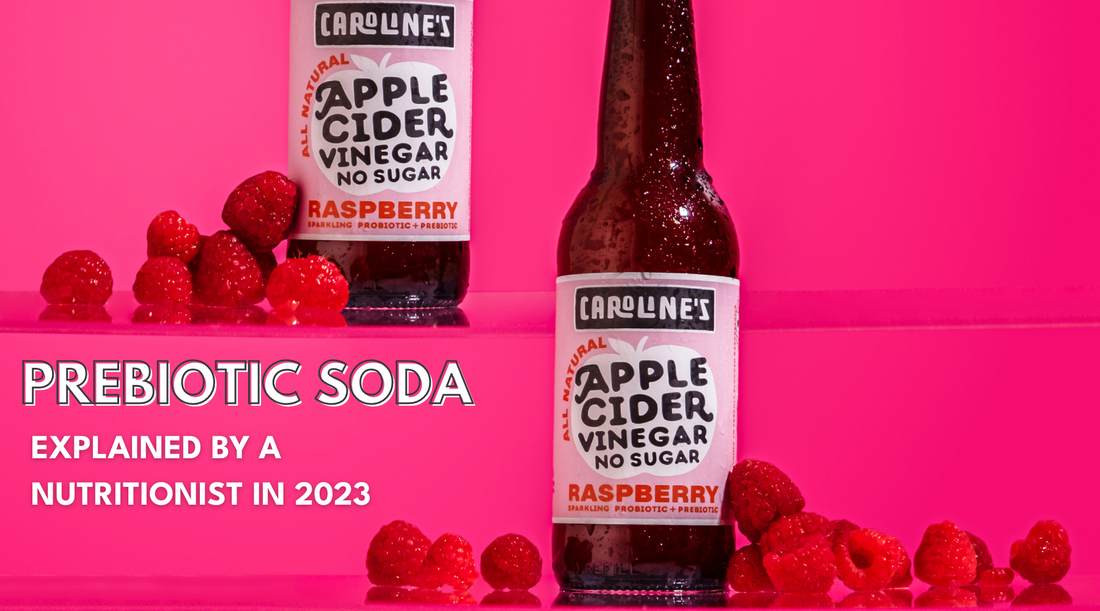
Prebiotic Soda Explained By A Nutritionist in 2023
Share
Prebiotic Soda Explained By A Nutritionist in 2023
Prebiotics drinks have been gaining popularity in recent years for their bubbly, refreshing and natural ingredients, but are they actually healthy? In this blog post, we’ll take a look at what a prebiotic soda is, discuss whether it is a healthy beverage, and let you know what to look for, and what to avoid in a prebiotic soda. Enjoy reading Prebiotic Soda Explained By A Nutritionist in 2023!

What is a Prebiotic Soda?
A prebiotic soda is a carbonated type of beverage that contains prebiotics. Prebiotics are dietary fibres that act as food for the beneficial bacteria within the gut. Prebiotic sodas are often healthier than your average soft drink and still taste delicious.
Many prebiotics soda’s don’t contain artificial sweeteners or refined sugar and are ethically aligned with other functional foods and drinks.

What does a Nutritionist think about Prebiotic Sodas?
When it comes to hydration and beverage enjoyment, certain prebiotic drinks may be a healthy addition to a balanced diet. Prebiotic sodas can be enjoyed occasionally when you need a refreshing and bubbly beverage.If you’re addicted to soft drinks, prebiotic sodas are a much healthier alternative, which your body will thank you for.
Not all prebiotic sodas contain healthy ingredients though, so it’s always best to read the ingredients list.
Keep reading below to learn more about what to look out for and what to avoid when buying a prebiotic soda.

Are Prebiotics Sodas healthy?
Prebiotic sodas can be part of a healthy and balanced diet depending on the brand chosen and the ingredients used. If you’re choosing for health it's best to pick a prebiotic soda that has minimal ingredients, avoids artificial sweeteners, is low in sugar and contains no additives or preservatives.
Prebiotics are a large part of what makes a prebiotic soda healthy. What are Prebiotics? They are nondigestible plant fibres that feed the good bacteria in the gut and encourage the growth and diversity of that bacteria. There are many types of prebiotics, however the vast majority of them are a subset of carbohydrate groups.
Prebiotics may help improve digestion, modulate the immune system, reduce the amount of pathogenic bacteria growth and enhance gut barrier health and integrity. As you can see prebiotics are incredibly beneficial for improving overall health.
Here's a list of the reasons why we believe some prebiotic sodas are healthy:- Contain prebiotics which support gut and immune health
- Lower in sugar than soft drink and juice
- Often also contains probiotics which can have a synergistic effect on gut health
- Generally include more natural ingredients, such as carbonated water and natural fruit flavours
- Can provide the body with hydration and joy

What to look for and what to avoid in a prebiotic soda?
It can be confusing choosing a healthy drink these days, there are so many options available in supermarkets and marketing can be incredibly sneaky.
Below we've created some top tips to help you choose the right prebiotic soda.
What to look for in a prebiotic soda:- Flavour that comes from fruit juice or natural flavours
- A good source of prebiotics, such as chicory root, inulin, or apple cider vinegar
- A natural sweetener, such as stevia, monk fruit or erythritol instead of artificial sweeteners
- Minimal ingredients and locally made
- Added sugars, which can feed the unhealthy bacteria present in the digestive tract
- Artificial sweeteners which can cause digestive upset and other health issues
- Artificial additives, flavourings and preservatives which can be harmful for your gut health

Prebiotic Soda VS Kombucha? What’s the difference…
When it comes to prebiotic sodas vs kombucha, there are some differences. Prebiotic soda is typically made with natural sweeteners and fermented sugars, while kombucha is made using tea, sugar, and a type of bacteria called SCOBY (Symbiotic Culture of Bacteria and Yeast).
Prebiotic sodas and kombucha are both carbonated drinks that may support a healthy gut. However prebiotic sodas contain prebiotics while kombucha contains probiotics.
Prebiotics feed the healthy bacteria in your gut while probiotics add more healthy bacteria to your microbiome.
There are some beverages available at the supermarket with both prebiotics and probiotics such as Carolines Drinks. They contain prebiotics from fermented apples (1.5 tablespoons of apple cider vinegar per serve) and six probiotic strains.
Carolines Drinks also have no added sugar, all ingredients are natural, carefully sourced and tested to meet Australian standards.
If you’d like to try Carolines Drinks head to our shop and If you’d like to read more about the health benefits of fermented apple/apple cider vinegar click here.

Blog Conclusion:
We hope you’ve enjoyed this blog post on prebiotic soda and learnt more about prebiotics and their benefits. Both kombucha and prebiotic soda can be a healthy addition to a balanced diet. Now you know what to look out for to choose the right brand!
About The Author:
Margo White is a Clinical Nutritionist who holds a Bachelor of Health Science in Nutrition and Dietetic Medicine. Margo uses food as medicine to gently nourish, strengthen and support health. She believes that life is about balance, and shouldn’t be restrictive. Margo advocates for an 80/20 way of eating; 80% whole foods and 20% soul foods - soul foods to nourish your soul and bring you great joy. When she’s not seeing clients in the clinic she is either in the kitchen developing recipes or creating content and blog writing for various aligned food companies.

References and Citations:
https://www.ncbi.nlm.nih.gov/pmc/articles/PMC6463098/
https://pubmed.ncbi.nlm.nih.gov/30219638/
https://pubmed.ncbi.nlm.nih.gov/30219638/
https://pubmed.ncbi.nlm.nih.gov/35434600/
-
Blog Post Formatted By: Steve Barko Digital Markerting
